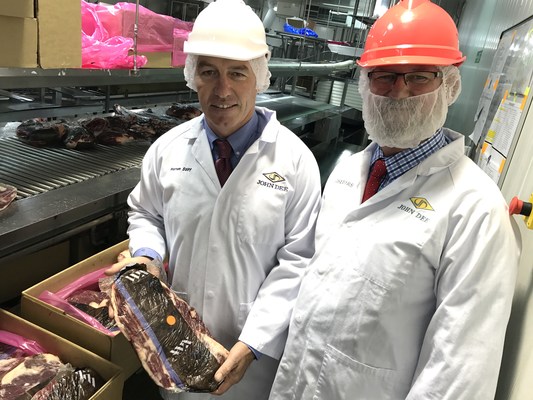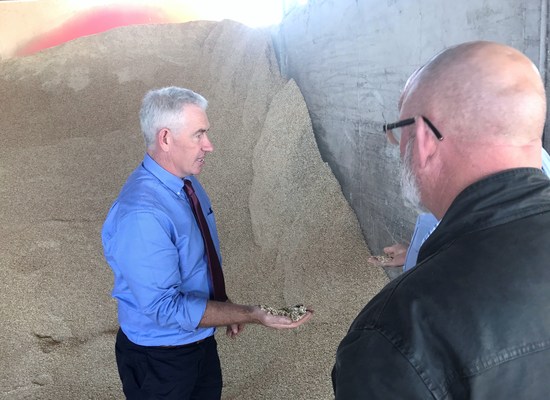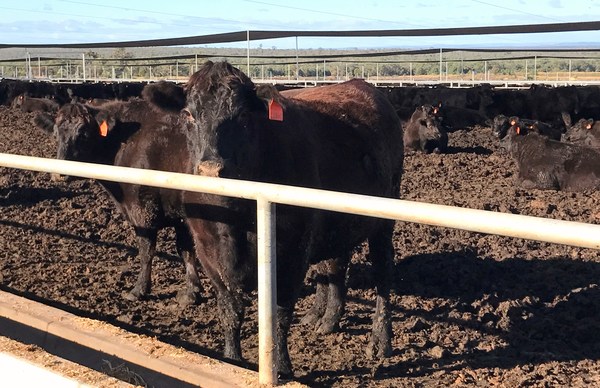By Jeremy Sollars
State Agriculture Minister Bill Byrne spent Monday of this week touring major local employer the John Dee export beef abattoir in Warwick and their feedlot near Inglewood.
With talk of an early State election escalating by the day – the latest rumours to come out of George Street in Brisbane suggest the last Saturday in July – Palaszczuk government ministers appear to be doing the rounds of regional Queensland in a big way.
And on the LNP Opposition side of things – the word is they’re planning to roll out Deputy Prime Minister Barnaby Joyce in a big way to win over Queensland voters instead of Malcolm Turnbull, an almost sure sign an early Queensland election is looming.
Mr Byrne told the Free Times he’s endeavouring to visit every meat processing facility in Queensland and speak to operators “on the ground” to find out what is happening in the industry.
He said the Queensland Government is focussed on “on-shore value adding of the state’s meat enterprises” and recognised the importance of attracting and keeping a “fit and motivated workforce”.
John Dee is awaiting outcomes on Federal and State funding applications to further expand its Warwick processing plant.
The company has 630 employees – across its feedlot and processing operations – and wants to bring in another 150 as it continues to expand.
John Dee processes around 2500 head of cattle every week, predominantly long-grainfed Wagyu and Angus.
The minister’s Warwick visit follows the announcement last week that Geoff and Rebecca Willett’s Maydan Feedlot at Bony Mountain near Warwick has been purchased by Gina Rinehart’s Hancock Prospecting Pty Ltd.
Hancock’s 2GR branded full-blood Wagyu cattle from New South Wales are already grain-finished at Maydan, which has an 8000 SCU (Standard Cattle Unit) capacity.
Mr Byrne told the Free Times John Dee had already made “significant investments and its plans for further growth were a great vote of confidence in the Queensland beef sector”.
“I want to congratulate John Dee on its $5 million investment in a new freezer and the company’s clear ambition to grasp the opportunities for growth,” the minister said.
“I am pleased to report that this year’s State budget is injecting $4.5 million into the RD&E programs and projects that help Queensland producers and the supply chain to remain profitable in a highly competitive world protein market.”
Mr Byrne also talked up the government’s ‘bovine repronomics project’, saying it focused on collecting “critical phenotypic and genotypic data on Queensland’s most important beef breeds … to underpin the continuing genetic improvement of these breeds into the future.”
“John Dee should be commended for their hard work in finding new niches and taking advantage of opportunities to export beef,” he said.
“New supply chain avenues have enabled John Dee to commission a new $5 million plate freezer and investigate new opportunities to expand its cold storage facilities.
“These expansions will complement the integrated supply chain that John Dee has sought with its feedlot and abattoir establishment.”
On Tuesday Mr Byrne visited Toowoomba where he launched a new research centre which he said would help Queensland producers “increase their resilience to drought and climate risks, thanks to a collaboration between the Palaszczuk government and the University of Southern Queensland (USQ)”.
Mr Byrne said the Queensland Drought Mitigation Centre (QDMC) was already helping Queensland producers better manage increasingly volatile climate events.
“While drought is a part of life in Queensland, it’s one of the biggest challenges faced by our producers which leads to significant economic, environmental and social impacts,” he said.
“No group is affected by changes to our climate more than producers. They are on the front line and that is why this initiative is a major advance for our food and fibre sector.
“The ultimate challenge for scientists is to be able to better predict the start and finish of a drought period.
“So to address this challenge, the Palaczszuk government has partnered with the USQ to form the QDMC which I’m officially launching today.”
Minister Byrne said researchers were analysing historical climate data, including modelling over the past 1000 years, to identify long-term patterns or links with climate drivers so producers can prepare more effectively and can become more resilient to droughts.









